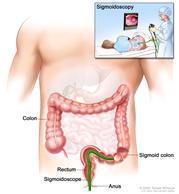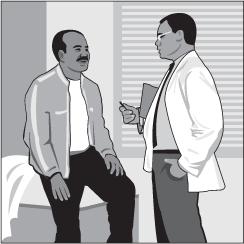Photos: Courtesy Internal Medicine News and the Cancer Institute
July 1, 2011
Tracey L. Chavous
Health and Wellness Writer
Healthy Living
According to the Centers for Disease Control and Prevention, cancer is the second leading cause of death in the United States. The causes of cancer  range from genetic predispositions to environmental influences to unknown factors. Types of treatments for cancer will depend on the stage of the disease, age of the patient and overall status of one’s health. In its early stages, some cancers may not have glaring symptoms, however, sonograms, mammograms, sigmoidoscopies and other various tests can detect abnormal growths or changes within the body.
range from genetic predispositions to environmental influences to unknown factors. Types of treatments for cancer will depend on the stage of the disease, age of the patient and overall status of one’s health. In its early stages, some cancers may not have glaring symptoms, however, sonograms, mammograms, sigmoidoscopies and other various tests can detect abnormal growths or changes within the body.
Many forms of cancer are treatable if the cancer is detected early; therefore, it’s important to pay attention to all of the possible warning signs. In most cases, these warning signs are not an indication of cancer; however, it’s worth a trip to your health care professional to rule out the worst case scenario. When cancer is caught early, it can save your life. Learn the danger signs and share them with your family and friends. You, in conjunction with your physician, are your best defense against cancer.
a trip to your health care professional to rule out the worst case scenario. When cancer is caught early, it can save your life. Learn the danger signs and share them with your family and friends. You, in conjunction with your physician, are your best defense against cancer.
To remember the seven early warning signs of cancer (as designated by the American Cancer Society), think of the word “CAUTION”:
 Change in bowel or bladder habits.
Change in bowel or bladder habits.
A sore that does not heal.
Unusual bleeding or discharge.
Thickening or lump in the breast, testicles or elsewhere.
Indigestion or difficulty swallowing.
Obvious change in the size, color, shape, or thickness of a wart, mole, or mouth sore.
Nagging cough or hoarseness.
The following symptoms may also signal the presence of some form of cancer:
• Persistent headaches
• Unexplained loss of weight or appetite
• Chronic pain in bones or other areas of the body
• Persistent fatigue, nausea, or vomiting
• Persistent low-grade fever, either constant or intermittent
• Repeated instances of infection
In addition to the listed symptoms, your overall wellness should include (if you can obtain it) a family health history. Seek information from family members in an effort to better understand your family health history and what your preceding relatives may have suffered from, if anything. It is also equally important that you keep a log of illnesses, test results, blood work results as well as discomforts you may have developed over a period of time. Monitor persistent coughs, skin growths, the timing of your headaches (pre-menstrual, ovulation, etc.) as well as your food/drink habits (your cravings, what doesn’t agree with you) and begin to learn intuitively how food and certain environments affect you and your overall well being.
If you walk away from an appointment with a diagnosis of cancer, know that as a patient, you have the right to seek a second opinion. There is a wealth of information, support and resources in most areas, so you don’t have to feel as isolated as you might think. The more you know, the better equipped you will be at making the best decisions about your treatment. Ask questions, talk with people you trust and take notes during doctor visits so that you can align yourself with the best care that you can find and afford. Cancer prevention is a life-long commitment to a long life of healthy living and it’s never too late to start. Make a healthy lifestyle a part of your daily routine so you will be here to celebrate many more healthy years with your family and friends.
If you have cancer or know someone who does, there are many resources and supports that are informative and free.
http://www.cancer.org/
The American Cancer Society’s site is dedicated to helping persons who face cancer. Supports research, patient services, early detection, treatment and education.
http://www.cancersurvivors.org/Resources/questions.htm
A site that lists all of the questions that you can ask about cancer from the doctor to a therapist!
http://www.canceradvocacy.org/toolbox/
The Cancer Survival Toolbox is a premiere education tool produced by and for cancer survivors, but it can help anyone who faces hard decisions related to a cancer diagnosis or other serious illness.
https://cissecure.nci.nih.gov/factsheet/FactSheetSearch8_3.aspx
This database includes Government agencies and national organizations that provide financial assistance to cancer patients and their families, or provide information about patient assistance programs.
http://www.caringbridge.org/
CaringBridge provides free websites that connect people experiencing a significant health challenge to family and friends.
http://www.happychemo.com/
Happy Chemo! eases the frustration and financial burden associated with cancer by connecting cancer patients, survivors and caregivers with discounts, special offers and helpful information provided by partner companies and organizations.
http://www.cancer.gov/cancertopics/factsheet/Support/resources
If you have cancer or are undergoing cancer treatment, this site can assist you with finding places in your community and around the country to turn to for help.
http://ww5.komen.org/
This site is dedicated to providing information and support about breast cancer.
http://www.westonaprice.org/modern-diseases/cancer/578-how-to-protect-yourself-against-cancer-with-food
A site that lists whole foods that prevent cancer.



